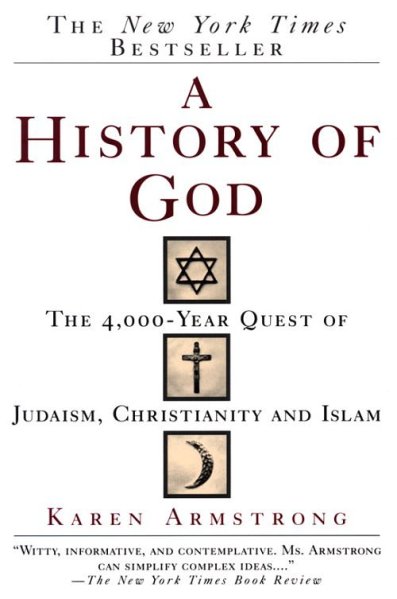Imagine for a moment a world without the concept of God. Would morality still exist? Would humanity possess the same sense of purpose or meaning in life? These are the types of intriguing questions that arise when delving into the profound depths of “A History of God.” This ambitious tome by Karen Armstrong offers us an exhaustive exploration of the diverse perceptions of God across different cultures and epochs. The book acts as both a scholarly analysis and a compelling narrative, revealing how the conception of the divine has evolved through the ages.
Armstrong’s journey begins with the earliest inklings of spirituality among humankind, tracing our instinctual connections to the sacred. The premonitions in ancient religions, from polytheism to the early forms of monotheism, are meticulously chronicled. Each section of the book invites the reader to grapple with the evolution of belief systems and the sociocultural contexts that shaped them. Can you imagine the very notion of divinity emerging from the primordial darkness? Armstrong vividly describes how the ancients looked to the heavens, crafting gods in their likenesses, each embodying the nuances of human experience.
As the arc of history unfolds, “A History of God” deftly navigates the tumultuous waters of religious evolution. Armstrong’s prose is accessible yet laden with intellectual rigor, making even the most complex theological concepts approachable. By dissecting the characteristics of deities as seen in religions such as Zoroastrianism, Hinduism, Buddhism, Judaism, Christianity, and Islam, the book underscores the thematic tapestry that binds them together. Armstrong introduces us to the idea that, despite their surface differences, these religions share essential truths, fostering the potential for interfaith dialogue.
Yet, there lies a challenge amid this exploration. Would you dare to question the very foundations of your faith? Armstrong implores readers to embrace discomfort as a catalyst for growth. She advocates for a nuanced understanding of spirituality that transcends rigid dogmas, prompting a reevaluation of our beliefs in the face of modernity. In a time when religious extremism often dominates headlines, can we summon the courage to dissect our convictions? Armstrong’s insights urge us to look critically at how historical grievances and ideological clashes have shaped contemporary perspectives on religion.
One of the most thought-provoking sections of the book involves the portrayal of God as an abstract entity—a design unseen yet deeply felt. Here, Armstrong evaluates the transition towards a more metaphorical understanding of divinity, particularly in the modern era. This evolution begs the question: Can God exist as a symbol rather than a mere being? As societies grow more complex, the allure of a personalized spirituality rises, challenging organized religion’s dominion. Armstrong subtly suggests that this shift may not be a departure from faith but rather an invitation to embrace a more fluid conception of the divine.
The latter chapters delve into the implications of this evolution, specifically addressing the fraught relationship between faith and reason. Armstrong compellingly argues that the Enlightenment’s emphasis on rationality sowed the seeds of conflict between science and religion. Are we, in our pursuit of knowledge, relegating the sacred to mere superstition? This exploration of antagonism reverberates today, as heated debates about creationism, evolution, and morality persist. Armstrong does not shy away from these contentious dialogues but instead encourages a synthesis of inquiries—paving a pathway that transcends the dichotomy of the secular and the sacred.
For individuals navigating this intricate landscape, “A History of God” emerges as a beacon of enlightenment. The book fosters an environment ripe for reflection, providing readers with the tools to reexamine their own faith and beliefs critically. Whether you are a devout believer grappling with doubts or a curious skeptic seeking answers, Armstrong’s dialogue engages the intellect while stirring the soul. What if, instead of searching for definitive answers, we embraced the quest as a sacred journey in itself?
A particularly engaging aspect of the book is its deft use of historical anecdotes that illustrate the transformative power of belief. Armstrong recounts the stories of influential figures and events, showcasing how fervent faith can incite both creative and destructive impulses. This interplay of light and shadow in the human experience posits a ferocious inquiry: Does religion serve as a unifier or a divider? The contexts she provides allow the reader to navigate these complex relationships without succumbing to oversimplified judgments.
In summary, “A History of God” is more than a mere scholarly exploration; it’s an invitation to embark on a personal odyssey. It dares readers to wrestle with profound questions about existence, purpose, and community while encouraging an understanding that is as much based in empathy as it is in analysis. Engage with this captivating work and discover not just the history of God through the ages, but, perhaps more importantly, your own evolving relationship with the divine. The quest for understanding is both daunting and exhilarating, yet therein lies the essence of humanity itself.
Are we ready to face the intricacies of spirituality with open minds and hearts? Are we willing to embrace the uncertainty of belief as we navigate this complex web of existence? “A History of God” serves as a guide, illuminating paths previously obscured by dogma and convention.
